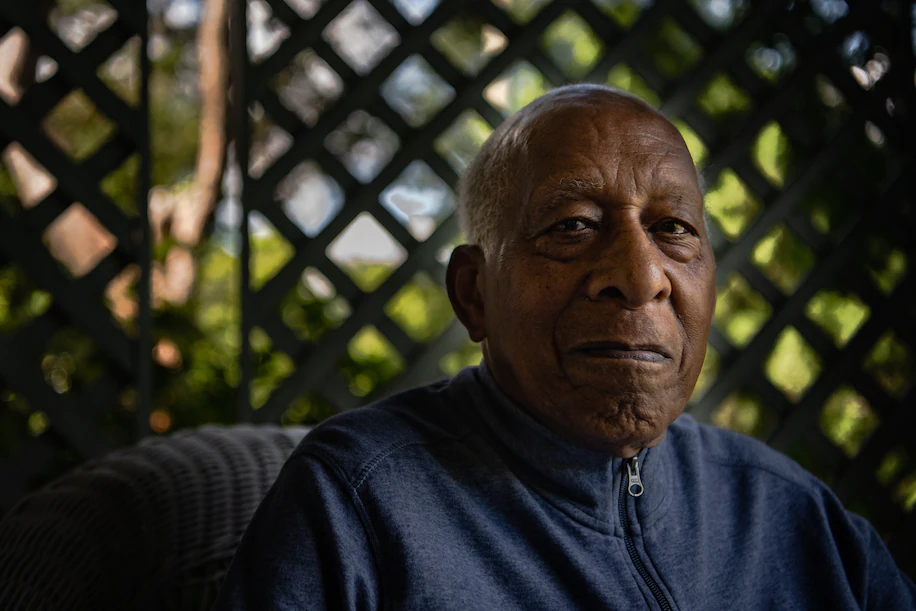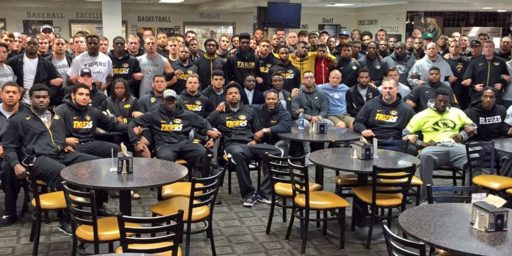One of Last Ties to Slavery Passes at 90
Possibly the last child of an American enslaved person has died.

Interesting reflection from Harrison Smith at WaPo: “Daniel Smith, one of the last children of enslaved Americans, dies at 90.”
Growing up in the 1930s, Daniel R. Smith would listen to stories from his father, as young boys often do. He was not supposed to hear these stories — they were meant for his older siblings, not for a child as young as 5 or 6 — but after dinner on Saturday evenings he would sneak out of bed and listen to accounts of the “whipping and crying post,” of the lynching tree and the wagon wheel.
These were brutally vivid stories of bondage, for his father had been born into slavery in Virginia during the Civil War and had toiled as a child laborer before making his way north to Connecticut, where the Smiths were among the only African Americans in their town.
“I remember hearing about two slaves who were chained together at the wrist and tried to run away,” Mr. Smith recalled decades later. “They were found by some vicious dogs hiding under a tree, and hanged from it. I also remember a story about an enslaved man who was accused of lying to his owner. He was made to step out into the snow with his family and put his tongue on an icy wagon wheel until it stuck. When he tried to remove it, half his tongue came off.
“My father cried as he told us these things.”
Mr. Smith, who was 90 when he died Oct. 19 at a hospital in Washington, was one of the last remaining children of enslaved Black Americans, and a rare direct link to slavery in the United States. Born when his father was 70, he was part of a generation that dwindled and then all but disappeared, taking with them stories of bondage that were told firsthand by mothers and fathers who, after enduring brutal conditions on Southern plantations, sought to build a new, better life for their families.
Aside from another reminder of the barbarism of slavery, the obit uses Smith’s passing as evidence of Faulkner’s observation, “The past is never dead. It’s not even past.”
Historians say it is impossible to know how many children of enslaved people are left. But while researching her book “Sugar of the Crop: My Journey to Find the Children of Slaves” (2009), author Sana Butler was able to track down about 40 who were still alive. All have since died. Mr. Smith was not featured in the book, although he later met Butler, who helped edit his forthcoming memoir, “Son of a Slave: A Black Man’s Journey in White America.”
His story was “a reminder that slavery was not that long ago,” Butler said. “You talk about the transatlantic slave trade, you talk about Reconstruction, and people really think that it’s history,” something that happened in the distant past and has little relevance today. “Mr. Smith,” she added, “is a reminder that it’s impossible to ‘get over it,'” to move past slavery and act as if it is no longer matters, “because it’s still [present] within these families’ lives.
The odds are pretty good that Smith was the last child of a former slave, certainly one whose parent was old enough to have any memory of being enslaved. The Emancipation Proclamation was issued in 1863 and the 13th Amendment was passed in 1865. Juneteenth, now a national holiday, was June 19 of that year. That was 157 years ago.
And, yes, that’s a long time. At the time of the Gettysburg Address, you’ll surely recall, the country was a mere four score and seven. Juneteenth was seven score and seventeen years ago.






Meanwhile, slavery is on the ballot in five states next month.
RIP dear sir, you’ve surely earned it many times over.
@Tony W: Sure, but they’s talkin’ bout prisoners–who everybody knows is even worst than n[expletive, deleted].
And even in places where it is finally repealed completely by these ballot measures, “… they would not automatically change protocols on prison labor or inmate pay.” Interesting to me is that one of the states in question is Oregon, where IIRC early settlers, mostly from “the land of cotton,” solved their disdain for having entered the union as a “free” territory by barring blacks from living there. Fun stuff.
“One of the last ties to slavery”???
Oh no. Ohhhh no. We have plenty of ties to slavery.
‘Enslaved Americans.’ Jesus Christ. Six syllables is just so much better than one.
Definition of ‘enslaved American’? Slave. Translation in our heads? Slave. Is there a point to this circumlocution? We already know from context that we are talking about slaves in America as opposed to slaves in, say, Rome. Or are those ‘enslaved Romans?’ Except, wait, Roman citizens were by definition not slaves, and their slaves came from many countries. I mean, a Greek slave would not have wanted to be called an enslaved Roman, would he? How would an ethnic Duala from west Africa wish to be labeled? As an American?
I don’t think ‘enslaved American’ cuts it. Too simplistic, not nearly precise enough, or wordy enough. How about ‘enslaved person whose ancestors may have belonged to any of a number of ethnic groups within Africa and were denied true American citizenship?’
Can people just stop fucking with the language to hoist themselves up on a pedagogical pedestal?
I was going to write on this as well, but James beat me to it.
What I wanted to note is that while I recognize this is an unusual situation given the age of the father, it underscores how recent the past really was, despite the fact that a lot of people want to pretend like it was all no longer relevant or just something from the truly distant past.
Not to mention how many people alive have direct memories of Jim Crow and even after its official demise of systemic, ongoing racism.
@Michael Reynolds: I take your point, although I can see defending the formulation “enslaved America” over “slave” because it emphasis that those slaves were Americans, which is not an unimportant thing to emphasize (and yes, before someone says it, I know that they were not legally recognized as citizens).
@Steven L. Taylor:
I was going to say it myself, but I was in a hurry to watch the sunset from the veranda of my hotel on Santorini.* (Went down too quickly, IMHO, and they really should do something about that.) While drinking surprisingly well-executed Manhattans.
*Detail supplied for purposes of annoying readers.
@Michael Reynolds: There is a growing consensus that “slave” is dehumanizing. I agree that “enslaved person” is clunkier. I add “American,” both for the reason @Steven L. Taylor notes and because slavery remains an active institution elsewhere.
@Tony W: Whether requiring prisoners to perform manual labor is a good practice is debatable. It is, however, not slavery. Indeed, the 13th Amendment specifically permits it.
@Michael Reynolds:
The point of most “X-noun” to “X-adjective person” migrations is to emphasize that the X is not some intrinsic property of the person in question, but rather something that was external imposed on them by society. Because a lot of people who cling to the “X-noun” formulation are specifically trying to imply the person in question is essentially different from other people and thus bear ultimate responsibility for their condition.
In this case, a person is not enslaved because (as the defenders of slavery often suggested) they were born suited only for such a position, but rather because a group of people used physical violence to force them into that position.
@James Joyner: Why in the heck would the term “slave” be considered “dehumanising”? What are we going to replace it with? “Freedom-deprived humans”?
It’s stuff like this that makes people vote against the Democratic Party. It certainly makes my teeth ache. Bah.
@Michael Reynolds: My guess was that the author was going for derailing the (your?? maybe…) the counter locution:
@Just nutha ignint cracker: I misspoke related to my completely incoherent previous comment to Mr. Reynolds. I was thinking about another thought–maybe from a completely different post. In my defense, I just woke from a nap that I took in the wake of reading after I refused substitute teaching jobs this morning.
@grumpy realist: “It’s stuff like this that makes people vote against the Democratic Party.”
Yes, you should definitely vote for politicians who want to strip women of their rights, outlaw gay marriage and slash taxes for billionaires if the other side uses rhetoric with which you don’t agree. Good to know you can’t be swayed from focusing on the important things.
@Just nutha ignint cracker:
Professor Quintard Taylor of the U of Washington, perhaps the greatest expert on the topic of blacks in the western US, has a different take on Oregon banning blacks. In one of his lectures he made a solid case that the main impetus behind that act was to preemptively block slavers from moving to Oregon. The state was being homesteaded like crazy and there was a genuine fear in the farmers of the Willamette the Southern slavers might get that idea. No free farmer wants to compete against a slaver, and the civil war was fundamentally about expanding slavery to the west.
He cites the few free blacks who were already there not being chucked out as an example, among other things. However there was a certain segment of the society which took the act at face value, no doubt about it.
@wr:
I was going to write a long response, but… I’ve had a couple drinks and I’m going to be polite.
I’ll just leave it at this: Turning away from the authoritarian left does not mean that one has to embrace the authoritarian right. Marc Victor is currently polling at 15% in the Arizona senate race with a message of “live and let live”. 15% is astounding for a third party–especially on that’s been fielding idiots (but has a few serious contenders, such as Justin Amash).
Voters want alternatives. 40% of voters don’t turn out for Presidential elections. 60% don’t turn out for mid-terms. Could it possibly be that out system only gives us undesirable candidates on either side of the spectrum?
I absolutely hate that I’m voting straight-ticket this year. I can’t vote on the issues, I can’t vote on who I think will best serve my area, I can only decide which Caesar will be less hurtful to me and mine.
When people say “I just might vote the other side”, the last thing you want to do is ridicule them. You want to find out exactly why you’ve driven away a former supporter. Get off your high horse, put your boots in the mud, and talk to the people you claim to represent.
@dazedandconfused: That the Oregon Territory was established in 1848, before the Kansas-Nebraska act (1854) muted the Missouri Compromise would seem to argue against his assertion, but I’m not enough of a historian to be willing to go back into the records of the territorial legislature to explore the proposition. So let everyone believe whatever they choose until someone presents a definitive answer. I’ll go with my usual Manichaean worldview to shape mine.
@Mu Yixiao: “Turning away from the authoritarian left does not mean that one has to embrace the authoritarian right.”
It may if one wants to run as a Republiqan, Marc Victor’s astounding 15% support (which will not get him elected, for the record) notwithstanding.
@Just nutha ignint cracker:
[not edited to add:] But it may provide the margin that splits the vote in favor of the
authoritarian RightRepubliqan candidate. Sadly, if the system essentially provides a binary choice, you have to choose a side or stay out.@Just nutha ignint cracker:
If you ever do decide to go back and look at the history, bear in mind there was a strong debate in the territory and the provision in the act which banned black people was just a part of the act which banned slavery in the territory. In the professor’s view banning all blacks was a clever legislative maneuver to quell opposition. It also was a preemptivee check against potential monkey-business such as labeling one’s own slaves “prisoners” or some-such.
@wr: Well, that’s exactly the point. Instead of arguing for women’s rights, et al, energy is wasted telling otherwise persuadable people that they are tone-deaf or racist or worse for accidentally using a word that is slightly outdated according to some pipsqueak somewhere, usually a college kid that already knows everything. (I don’t totally blame them, it’s a phase and at least they’re infinitely more thoughtful than a member of the Young Republicans.)
I had a relative (in college at the time) going off about the data busses in computers using the terms master and slave. Oh the horror, I’m sure those devices were mortally offended. Talk about dehumanizing! Oh, wait …
@dazedandconfused: I probably will never dig into the history. I did a while back and the book that I was reading about Oregon State and the Washington Territory at the time of the Civil War made the claim that the breakdown of settlers at the territory was settled was that considerable numbers of Southern settlers settled in what became Oregon state whereas more Northern emigres settled in Washington. That particular factoid/conjecture seems to explain a great deal of the difference between the two states that I’ve seen over the 70 years I’ve lived in the PNW and the most recent 30 that I mostly lived in SW Washington/NW Oregon–one point being the factoid mentioned in the early posts of the thread:
Which states the others are makes an interesting coincidence at the very least.
@Just nutha ignint cracker:
The act banned blacks was all the way back in 1844.